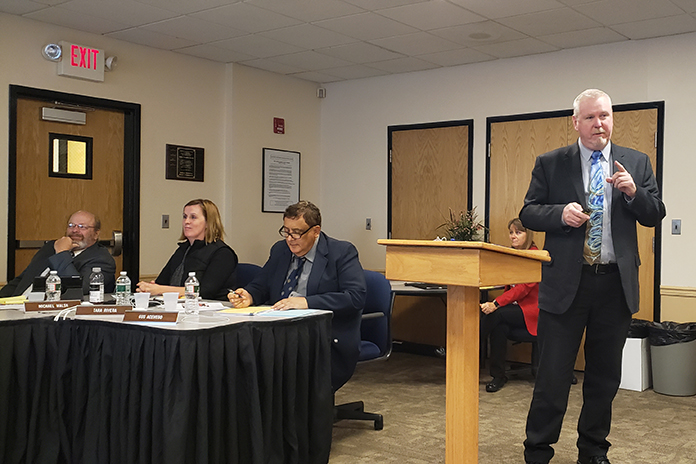
JACKSON – School Board members and district administrative staff recently heard its regular energy conservation program report and also heard from Josh Costell, executive vice president of Energy Efficiency Division of DCO Energy.
John Blair, the district’s energy education specialist made his presentation concerning the district’s energy conservation program during the meeting aimed at saving the district money and reducing its carbon footprint as a greener, leaner district.
“We don’t want to be wasteful. If we see the air conditioning left running on a Sunday night in the Fine Arts Auditorium (at Jackson Memorial High School) that is money just flying out the door,” Blair said.
Blair showed a PowerPoint presentation that featured a before and after look at how the district had saved money simply my monitoring systems that were left operating when not in use by staff or students including computers in the school’s libraries and classrooms.
“Those computers, if left operating 24/7, per week would cost $3 to $4 each in electricity and we have 1,500 of them, Blair said.
He added that part of his job involves talking to staff and students about what he does within the district. “I also build up the whole green thing. If you get people to think green we can save green. I say it all the time, think green, save green.”
Blair joked, “people call me names behind my back when they see me in the faculty rooms, hallways and classrooms. We have a huge culture of sustainability here in Jackson and it goes hand and hand with savings.”
He said that culture gets students and staff into the habit of shutting lights, computers and other electrical devices off as they exit the classroom on a regular basis.
“It is penny pinching but it is penny pinching on a massive, massive scale and thousands of people, staff and students save us money. Tree planting, aquaponics all of this goes hand in hand because you want people to think that way and if they think that way the energy savings just tag along. We’ve installed water bottle filling stations in seven of our buildings and those stations have saved us from over 10,000 plastic water bottles,” Blair said.
“People are always asking me can you get me a recycle bin but they do cost money. This summer we always wax the floor in all the schools so we saved the buckets, cleaned them out and slapped a sticker on them and every classroom at Memorial High School and Johnson school has them and we’re going to do it again next year. Those are 500 buckets at $10 each.”
Blair reminded the board and staff that “we are part of the Power Saves Schools program in each school they have their own little Green Team and they are champions of saving energy.”
One board member remarked seeing the photo in Blair’s PowerPoint presentation regarding the mascot for the program, a costumed character called “the Energy Hog.”
We did an assembly with him last year at the Switlik school. He’s a bad guy. He loves to waste energy so when he gets on stage the kids boo him.”
“So that’s your alter ego,” Board member Thomas Colucci joked.
“Actually, I don’t put the suit on I always get someone else to do that,” Blair responded.
“We had five interns from the STEM program and one is in the audience is right now and this was his quote, (included in the PowerPoint presentation) ‘At first it was like trying to take a sip of water from a fire hydrant’” about how much information is available about learning how to go green, he said. Sustainable New Jersey came out and did a presentation for the students. All the interns were there for a three to four hour discussion about energy conservation. “Our theme was ‘it is more than just about shutting off the lights!’ For the third year running we received awards from Sustainable New Jersey.”
Blair moved on to discuss the Energy Savings Improvement Program (ESIP). ESIP is a way for government agencies to make energy related improvements to their facilities and pay for the costs using the value of energy savings that result from the improvement.
Blair described ESIP saying that after interviewing several companies that would help the district, DCO Energy was hired. “We are obviously going to take advantage of this program. Basically, we are looking at a $27 million energy efficient capital improvement program that has a net zero cost to the taxpayer for the next 20 years.”
Costell said Jackson already “has done remarkably with many of the operational aspects of the project. Being a New Jersey resident I understand the impact of S-2 (a state aid funding formula which has resulted in large funding reductions for the Jackson School District and others throughout the state). For Jackson to lose $17 million over the next seven years, this is something that can at least help minimize some of the impact that would normally occur from that.”
“Your annual energy cost savings will be a $1.3 million with 27% of the savings coming from producing your own electricity. The real impact of that is that you can produce it cheaper than you can buy it. On top of that you will get right about $1.3 million from the state as a grant. The savings you are getting they will right you a check for $1.3 million for one time,” Costell added.






